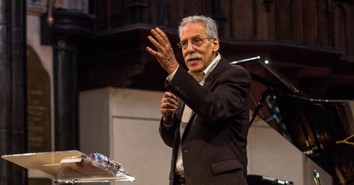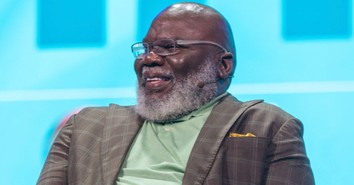I believe God has so much compassion for the confusion the younger generations are battling with the Church. We’re at a time in history where so much is being exposed in our world–systemic racism, capitalist greed, political warfare and environmental carelessness, to name a few. Unfortunately, the Church is not excluded from the influence of these same systems. Millennials are noticing and calling out for change, and when they don’t see changes in the Church, they leave.
So whenever I hear of a friend leaving the Church because of spiritual abuse, disillusionment or hypocrisy, I understand. I get it. It’s challenging to determine who God is from what people have done in the “name of God.”
But, even though I see their point of view, I know that leaving God because of what people have done is never the answer. Not all churches are spiritually harmful. And even if they were–God is still good. And always will be.
Church culture may have gotten some things wrong and caused real pain, but I believe there is still real joy in following Jesus.
Here is a list that I hope will encourage anyone on their journey to leave old, harmful lies behind to adopt new, faithful and exciting ones.
Photo courtesy: ©iStock/Getty Images Plus/byakkay

1. Denying Yourself Doesn't Mean Never Doing What You Want
In Matthew 16:24, Jesus tells his disciples, ‘“Whoever wants to be my disciple must deny themselves and take up their cross and follow me.’”
Denying yourself is a biblical concept. Denying your sinful nature, denying who you are without God guiding you. But denying yourself doesn’t mean you never do what you want, as some unhealthy church cultures would have you believe.
If you have a 5-year-old child that you love dearly, you would certainly want them to deny their impulses to run into the street without looking or biting their sister. But would you want them to also deny every activity that brought them joy? Would you want their life to be an endless submission to what everyone around them wanted to do, cutting them off from their true selves and passions? Of course not!
I had a tough time accepting this in college. I felt like I had to “deny myself” and constantly exert energy towards Bible studies, evangelism, and ministry planning–to the point where I felt guilty for having fun or taking a nap when I needed it. But God didn’t want me to live that way.
It makes sense that if someone feels like the church expects them to work themselves to the bone and never speak up for what they want, they would want to leave that environment. But you can embrace a healthy sense of denying yourself while still embracing and fully enjoying who God made you to be.
Photo courtesy: ©Getty Images/Franck Reporter

2. Working Hard for God Doesn’t Mean Never Resting
Working hard for the Lord is important. After all, God arranged good works for us to do (Ephesians 2:10), and we owe God everything we have.
But scriptures like Romans 12:1 can be used to convince church members to push past their God-given limits: “Therefore, I urge you, brothers and sisters, in view of God’s mercy, to offer your bodies as a living sacrifice, holy and pleasing to God—this is your true and proper worship.”
Being a living sacrifice means offering yourself fully to God. And sure–if God demanded that we worked tirelessly, who are we to deny him? But God isn’t asking that of us. So we shouldn’t arbitrarily do that to ourselves or expect others to do so. Because while being a living sacrifice is a command, it’s also true that Jesus invites us into this:
“Come to me, all you who are weary and burdened, and I will give you rest. Take my yoke upon you and learn from me, for I am gentle and humble in heart, and you will find rest for your souls. For my yoke is easy and my burden is light.” Matthew 11:28-30
Rest is good. Rest is holy. Rest is productive. God commands everyone in the Torah to sabbath–a whole day of rest!
So even if your church has taught you to work yourself to the bone for God’s sake, know that you are allowed to set your own boundaries around your rest. It’s part of what makes God the loving, caring Father that he is.
Photo courtesy: ©Getty Images/AsiaVision

3. Putting God First Doesn’t Mean Having No Other Interests
I have one friend I’m faithful will make her way back to God one day, but she is taking a break from Christianity right now. What makes me especially sad about her absence is that she partially left so she could do things she loves–traveling, dancing and going on adventures. But God never had any problem with those things to begin with!
In an effort to keep church members from idolatry, toxic church culture can put such an emphasis on putting God first that it leaves no room for anything else. Of course, this is never stated explicitly. But when you are expected to attend church events four times a week, only be involved in activities if they’re means of evangelism and keep yourself from anything that could be deemed by anyone as unholy, it’s easy to read between the lines.
I dearly hope my friend will go salsa dancing with God someday. That she’ll take a trip somewhere tropical and beautiful just to experience the beauty God made and breathe him in. And to know that the things that set her soul on fire are the very ways God means to communicate with her–not sinful desires that she should be ashamed of.
If you feel guilty for participating in something other than church or Bible study–something just for fun–ask yourself if this is actually taking you away from God or if it can be a way to get to know God better. And if it’s the latter, don’t let church folks talk you out of something so special!
Photo courtesy: ©Getty Images/Delmaine Donson

4. There Is No One True Church, and That’s a Good Thing
Part of the process many millennials are going through is realizing that what they’ve been taught as absolute truth growing up might actually be open for interpretation. Matters like gender roles, homosexuality, and salvation are not listed out in Scripture as clearly as our predecessors would like us to believe (and probably want to believe for themselves because it’s easier!)
Nobody in my personal church movement would say this out loud anymore, but there was a period, decades ago, when it was taught that our movement was the One True Church. That everyone else had it wrong because this movement was the only one that was really committed to living out the Bible and knew the absolute truth, backward and forwards.
As sad as that is, I’m sure we’re not the only ones to have believed that at some point. And it’s easy to jump from “everyone can have different convictions” to “everyone is making up their beliefs” or “there is no absolute truth.” But I believe Christianity is a mystery on purpose, and our different convictions make our faith rich.
As Westerners, we’re extremely uncomfortable with gray areas. We like to believe the truth is black-and-white, obvious and in your face. But the Bible wasn’t written to our modern, Western culture. It was written to Easterners who believe that truth isn’t a static, black-and-white thing. It’s dynamic and unfolding. And it’s okay if you don’t know everything all the time.
You can listen to this podcast episode from Bema if you want to hear more about this different paradigm of Easterners. But because of our black-and-white thinking, it’s really easy to throw the baby out with the bathwater and go to the other extreme of believing that because we can’t be certain, no one’s convictions matter, and we might as well be making it all up, anyways.
But faith is a wrestle. It’s a lifelong dance. The same is true of marriage–what you believe to be true about your spouse changes over time. Not because your spouse is a different person necessarily, but because life changes your perspective and values.
How boring would it be if Christianity really was black-and-white? What would be the point of knowing God ourselves if we could just read a bunch of rules and know what life was made of?
Isn’t it so much more special and rich to grow over time and learn from others’ perspectives? There is so much beauty in not agreeing with other Christians about everything. Because in the end, it’s really our faith that matters–not if we guessed correctly.
So it’s okay to let go of black-and-white beliefs while still holding onto your faith in God.
Photo courtesy: ©Getty Images/People Images

5. 'The Heart Is Deceitful' Doesn't Mean You Can't Trust Yourself
Jeremiah 17:9 says, “The heart is deceitful above all things and beyond cure. Who can understand it?”
In an attempt to keep church members from making ungodly decisions, especially within gray areas, this Scripture has been misused by toxic church culture to keep people from making decisions based on anything other than the Bible.
But, as said above, the Bible can have a lot of gray areas! And there isn’t always one right answer when it comes to a career change, a relationship, a move, etc.
For me, hearing this Scripture brought up in so many irrelevant scenarios caused a deep distrust within me. I didn’t trust myself to be anything but selfish, even when I was simply taking care of myself!
Further, it caused me to ignore red flags from a toxic church environment because maybe I was just being prideful. Because “maybe my heart was just lying to me.”
But Job 38:36 also says, “Who gives intuition to the heart and instinct to the mind?”
Our gut feelings are from God. Our ability to match the right principles with the right situation with the right nuance, otherwise known as wisdom, comes from God. And our heart’s ability to tell us the truth is a gift from God!
Proverbs 11:14 exhorts us with “For lack of guidance a nation falls, but victory is won through many advisers.” So advice is a good thing. Getting different opinions about gray areas is a good thing.
But it doesn’t mean that your own heart can’t be trusted. And trusting your heart, leaning into what it’s telling you, is actually a doorway into a rich, textured, full faith. One that can still see God through all the church-y chaos.
Wading through these principles and finding out what I think a scripture is saying based on who I believe God to be has been a journey over the past several years. If you’re on that journey now, I sincerely hope and have confidence that it will lead you to a God who is more loving, patient, creative, gracious and fun and believes in you more than you ever thought possible.
Let go of religiosity. Hold onto God.
Photo courtesy: ©Getty Images/Pcess609
Originally published August 17, 2023.






